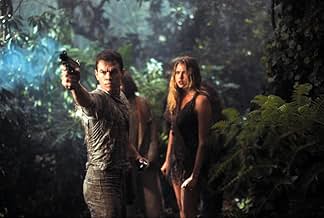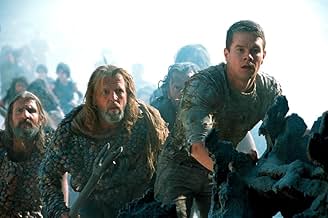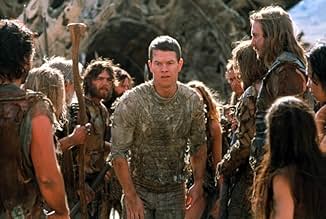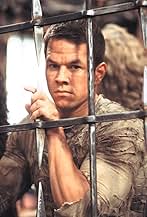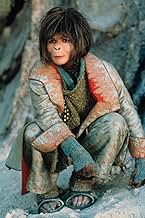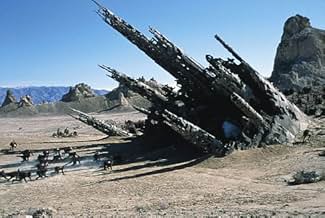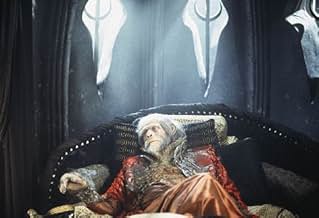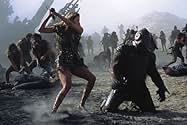Nel 2029, un astronauta dell'aeronautica militare si schianta su un misterioso pianeta dove delle scimmie evolute parlanti dominano una razza di umani primitivi.Nel 2029, un astronauta dell'aeronautica militare si schianta su un misterioso pianeta dove delle scimmie evolute parlanti dominano una razza di umani primitivi.Nel 2029, un astronauta dell'aeronautica militare si schianta su un misterioso pianeta dove delle scimmie evolute parlanti dominano una razza di umani primitivi.
- Regia
- Sceneggiatura
- Star
- Nominato ai 2 BAFTA Award
- 11 vittorie e 32 candidature totali
Evan Parke
- Gunnar
- (as Evan Dexter Parke)
Recensioni in evidenza
7.5/10
I really appreciate the different approach to the story from Tim Burton's as i really think this Planet Of The Apes remake was pretty good overall, but what lacking the most i think was that because i believe this is a pretty straight forward movie, it happens pretty quickly to the conflict that i felt what lacking the most was the characters development, i do felt in the first half of the movie there is not much of a personality in the characters specifically Tim Roth and Helena Bonham Carter characters, Thade i found quite annoying instead of terrifying in the first half until at the end i can admit that he was basically a mad ape, and Ari was just not as good of a character or sweet of a character as Dr. Zira in the original even if they didn't want to make her like it, but it's not like i hate the characters, they just flawed characters, and i'm finally fine with them towards the end, including the story which i thought again not as clever as the original but i still really enjoyed it and in fact the best thing about the movie, i like the makeup and the costume design, i like Mark Wahlberg in the film, Tim Burton's Planet Of The Apes remake takes on a very different but still interesting take on the story, flawed but still pretty good overall.
If one wants to remake a movie, the best option is probably to choose and original that was good, but not a great classic. Clearly, any attempt to remake a concept that failed first time around is fraught with danger, but an attempt to remake a classic runs the risk that one's film will be unfavourably compared with the original. The original 1968 film of 'Planet of the Apes' is one of cinema's great science fiction classics. More than an adventure story, it touches on some of the concerns of the late sixties- the fear of nuclear war, race relations- and also raises more fundamental issues about the relationship between man and nature, the relationship between religion and science, Darwinism and animal rights. It was therefore a brave move on Tim Burton's part to try and remake it.
The main concept of Tim Burton's film is basically similar to Franklin Schaffner's. An astronaut from Earth travels to a planet ruled by intelligent apes. Humans exist on this planet, but they are regarded as an inferior species, despised and exploited by the apes. There is, however, an important difference. In the original film, the apes are the only intelligent and articulate beings on the planet. Although they have only attained a pre-industrial level of civilization (they have firearms, but no power-driven machinery, and no means of transport other than the horse or horse-drawn vehicles), they are a far more advanced species than the planet's human inhabitants, who lack the powers of speech and reason and live an animal-like existence. In Burton's remake, humans and apes have similar powers of speech and intellect; it is only the apes' greater physical strength that enables them to dominate the planet and to treat the humans as slaves.
It was this ironic role-reversal, with apes behaving like men and men behaving like beasts, that gave Schaffner's film its satirical power. That film was advertised with the slogan 'Somewhere in the Universe, there must be something better than man!', and the apes are indeed, in some respects, better than man. Their law against killing others of their kind, for example, is much more strictly observed than our commandment that 'Thou shalt do no murder'. There is no sense that the apes are bad and the humans good. Even Dr Zaius, the orang-utan politician, is not a wicked individual; by the standards of his society he is an honourable and decent one. His weakness is that of excessive intellectual conservatism and unwillingness to accept opinions that do not fit in with his preconceived world view. (In this respect the apes are very human indeed).
Burton's film takes a less subtle moral line. It is a straightforward story of a fight for freedom. The villains are most of the apes, especially the fanatical, human-hating General Thade. The heroes are Captain Davidson, the astronaut from Earth, the planet's human population who long for freedom from the domination of the apes, and a few liberal, pro-human apes, especially Ari, the daughter of an ape senator. The apes are more aggressive and more obviously animals than in the original film; they still frequently move on all fours and emit fierce shrieks whenever angry or excited.
There are some things about this film that are good, especially the ape make-up which is, for the most part, more convincing than in the original film and allows the actors more scope to show emotion. (I say 'for the most part' because Ari looks far less simian than do most of the other apes- Tim Burton obviously felt that the audience would be more likely to accept her as a sympathetic character if she looked half-human). The actors playing apes actually seem more convincing than those playing humans. Tim Roth is good as the militaristic Thade, as is Helena Bonham-Carter as Ari. Mark Wahlberg, on the other hand, is not an actor of the same caliber as Charlton Heston, who played the equivalent role in the original film, and Estella Warren has little to do other than look glamorous. (Heston has a cameo role as an ape in Burton's film, and even gets to repeat his famous line 'Damn you all to hell').
Overall, however, the film is a disappointment when compared to the original, a simple science-fiction adventure story as opposed to an intelligent and philosophical look at complex issues. It tried to copy the device of a surprise ending but failed. Schaffner's famous final twist is shocking, but makes perfect sense in the context of what has gone before. Burton's makes no sense whatsoever.
Tim Burton can be a director of great originality, but with 'Planet of the Apes' he fell into the standard Hollywood trap of trying to copy what had already been done and remaking a film that never needed to be remade. It was good to see him return to form with the brilliant 'Big Fish', one of the best films of last year. 6/10
The main concept of Tim Burton's film is basically similar to Franklin Schaffner's. An astronaut from Earth travels to a planet ruled by intelligent apes. Humans exist on this planet, but they are regarded as an inferior species, despised and exploited by the apes. There is, however, an important difference. In the original film, the apes are the only intelligent and articulate beings on the planet. Although they have only attained a pre-industrial level of civilization (they have firearms, but no power-driven machinery, and no means of transport other than the horse or horse-drawn vehicles), they are a far more advanced species than the planet's human inhabitants, who lack the powers of speech and reason and live an animal-like existence. In Burton's remake, humans and apes have similar powers of speech and intellect; it is only the apes' greater physical strength that enables them to dominate the planet and to treat the humans as slaves.
It was this ironic role-reversal, with apes behaving like men and men behaving like beasts, that gave Schaffner's film its satirical power. That film was advertised with the slogan 'Somewhere in the Universe, there must be something better than man!', and the apes are indeed, in some respects, better than man. Their law against killing others of their kind, for example, is much more strictly observed than our commandment that 'Thou shalt do no murder'. There is no sense that the apes are bad and the humans good. Even Dr Zaius, the orang-utan politician, is not a wicked individual; by the standards of his society he is an honourable and decent one. His weakness is that of excessive intellectual conservatism and unwillingness to accept opinions that do not fit in with his preconceived world view. (In this respect the apes are very human indeed).
Burton's film takes a less subtle moral line. It is a straightforward story of a fight for freedom. The villains are most of the apes, especially the fanatical, human-hating General Thade. The heroes are Captain Davidson, the astronaut from Earth, the planet's human population who long for freedom from the domination of the apes, and a few liberal, pro-human apes, especially Ari, the daughter of an ape senator. The apes are more aggressive and more obviously animals than in the original film; they still frequently move on all fours and emit fierce shrieks whenever angry or excited.
There are some things about this film that are good, especially the ape make-up which is, for the most part, more convincing than in the original film and allows the actors more scope to show emotion. (I say 'for the most part' because Ari looks far less simian than do most of the other apes- Tim Burton obviously felt that the audience would be more likely to accept her as a sympathetic character if she looked half-human). The actors playing apes actually seem more convincing than those playing humans. Tim Roth is good as the militaristic Thade, as is Helena Bonham-Carter as Ari. Mark Wahlberg, on the other hand, is not an actor of the same caliber as Charlton Heston, who played the equivalent role in the original film, and Estella Warren has little to do other than look glamorous. (Heston has a cameo role as an ape in Burton's film, and even gets to repeat his famous line 'Damn you all to hell').
Overall, however, the film is a disappointment when compared to the original, a simple science-fiction adventure story as opposed to an intelligent and philosophical look at complex issues. It tried to copy the device of a surprise ending but failed. Schaffner's famous final twist is shocking, but makes perfect sense in the context of what has gone before. Burton's makes no sense whatsoever.
Tim Burton can be a director of great originality, but with 'Planet of the Apes' he fell into the standard Hollywood trap of trying to copy what had already been done and remaking a film that never needed to be remade. It was good to see him return to form with the brilliant 'Big Fish', one of the best films of last year. 6/10
Awhile back, I commented on the original 'Planet of the Apes' film prior to seeing this remake at the cinemas. When I saw the original, I was fully expecting the remake to kick some serious butt, and be far superior to the 1960s version. Why? Better visual effects being 2001 and all, one of my favorite actors in Tim Roth starring in it, and a great director named Tim Burton. Nothing could surely go wrong with Burton in the director's chair. Granted, I was never a huge fan of the POTA films, but seeing the potential here for a remake or revision by Burton made my mouth water. Then, in 2001, I got advance tickets and I began to watch one of the most anticipated movies for that year...
I left the cinema very disappointed! Disappointment can cloud criticism though, and sometimes makes you bitter towards a movie and not see the positives. So I tried to look at the good. The make-up was excellent, but inconsistent in parts, but I still feel that area should have been nominated for an Oscar. Okay, that's good! Tim Roth was amazing in his performance but his character was not that great and seriously lacked depth. Helena Bonham Carter was also fairly decent in this film. And, finally some of the cinematography was fairly nice.
What really let the remake of 'Planet of the Apes' down, was by in large, Tim Burton. This is, without a doubt, his worst film that I've seen! I cannot really compliment the direction of this movie, as it seemed self-aware and indulgent in being the "remake". The script was awful, as well as the integration of one-liners from the original films to this new one. I groaned completely during Heston's cameo, particularly due the referrals to the original film. The remake should have been a film in its own right, and should have focused on creating a compelling story and universe, instead of opting for lame jokes revolving around Charlton Heston in ape make-up as Thade's father. The hero of the new film in Mark Whalberg was one-note, but he was given such a boring character who just went through the motions. Going to take a risk- check, gets sucked through a new dimension- check, captured by Apes- check, escape- check and so on and so on. I never felt anything for his character at all, and that was partly his performance and partly the woeful script/direction. Estella Warren was awful, and Kris Kristofferson played the obligatory predictable role of the her father. Michael Clarke Duncan suited his part, but never became a well established character, and Paul Giamatti was okay as Limbo, but was obviously the comic relief. I also did not like the art direction was the Ape City, and found the original far more convincing in look and as a story.
While, General Thade was certainly a memorable chimp because of Roth's performance, it's a shame the character was wasted in an extremely formulaic and cliche story! 'Planet of the Apes' (2001) is nowhere near the worst film of 2001, it certainly was the most disappointing for me, considering the potential it had with the dynamic vision of Tim Burton and the modern visual f/x to create a film that stands out in its own right. It's just a pity Tim Burton chose to make a Hollywoodized self-aware gimmicky version that ends up being significantly inferior to the original film, instead of on par with it! And yes, Burton's 'Mars Attacks' is also better than his remake here! 'Planet of the Apes' gets a reluctant pass for Tim Roth's performance, the superb make-up and the decent cinematography, however that still doesn't save it from silly mediocrity.
**½ out of *****!
I left the cinema very disappointed! Disappointment can cloud criticism though, and sometimes makes you bitter towards a movie and not see the positives. So I tried to look at the good. The make-up was excellent, but inconsistent in parts, but I still feel that area should have been nominated for an Oscar. Okay, that's good! Tim Roth was amazing in his performance but his character was not that great and seriously lacked depth. Helena Bonham Carter was also fairly decent in this film. And, finally some of the cinematography was fairly nice.
What really let the remake of 'Planet of the Apes' down, was by in large, Tim Burton. This is, without a doubt, his worst film that I've seen! I cannot really compliment the direction of this movie, as it seemed self-aware and indulgent in being the "remake". The script was awful, as well as the integration of one-liners from the original films to this new one. I groaned completely during Heston's cameo, particularly due the referrals to the original film. The remake should have been a film in its own right, and should have focused on creating a compelling story and universe, instead of opting for lame jokes revolving around Charlton Heston in ape make-up as Thade's father. The hero of the new film in Mark Whalberg was one-note, but he was given such a boring character who just went through the motions. Going to take a risk- check, gets sucked through a new dimension- check, captured by Apes- check, escape- check and so on and so on. I never felt anything for his character at all, and that was partly his performance and partly the woeful script/direction. Estella Warren was awful, and Kris Kristofferson played the obligatory predictable role of the her father. Michael Clarke Duncan suited his part, but never became a well established character, and Paul Giamatti was okay as Limbo, but was obviously the comic relief. I also did not like the art direction was the Ape City, and found the original far more convincing in look and as a story.
While, General Thade was certainly a memorable chimp because of Roth's performance, it's a shame the character was wasted in an extremely formulaic and cliche story! 'Planet of the Apes' (2001) is nowhere near the worst film of 2001, it certainly was the most disappointing for me, considering the potential it had with the dynamic vision of Tim Burton and the modern visual f/x to create a film that stands out in its own right. It's just a pity Tim Burton chose to make a Hollywoodized self-aware gimmicky version that ends up being significantly inferior to the original film, instead of on par with it! And yes, Burton's 'Mars Attacks' is also better than his remake here! 'Planet of the Apes' gets a reluctant pass for Tim Roth's performance, the superb make-up and the decent cinematography, however that still doesn't save it from silly mediocrity.
**½ out of *****!
Visually,this film is sometimes a splendor;the light falls on a crepuscular world.The Apes' town is quite scary particularly when you see it from a distance ,as it stands out against an ominous sky.In the very beginning,the cast and credits are also successful,with an adequate martial music.The first third has some funny,parodic and sometimes politically incorrect lines.In the second third,the movie begins to lose steam,although the discovery in the wrecked spaceship is a rather good idea. But that's not all good news.First of all,the hero lacks charisma and the apes and their sensational make-up simply overwhelm him and drown him out.On the contrary,majestic Charlton Heston,even when he was in chains,displayed a Shakespearian grandeur in the first version.
The last third consists in battles,a "second coming" and the "astonishing" ending without which..that would not be "planet of the apes".Actually,the new ending was borrowed from Pierre Boulle 's novel,but not without adding a mathematically unlikelihood which will give you headaches if you begin to think too hard:the least they can do:Everything ,even the proper nouns from the French writer's book have been removed,even if some characters recall some of the Boulle/Shaffner version.Shaffner had contented himself with changing the astronauts' name(eg:Ulysse Mérou=Taylor) Hats off to Helena Bonham-Carter who brings warmth and emotion in a rather vapid cast:in a part close to that of Kim Hunter/Zira,she really asserts her distinctive identity. Tim Roth is effective as well,but his part is less so.David Warner and Kris Kristofferson are wasted.As a tribute to Shaffner(?)both Linda Harrison (an unidentified woman captured with Leo) and Charlton Heston (moaning his curse,which is,admittedly,funny)appear unbilled.
Tim Burton might be a director to remember.Although he has not made a genuine masterpiece yet,his filmography is already rich:"Sleepy hollow","Edward Scissorhands ,the marvelous "Ed Wood" (Martin Landau is unforgettable).But redoing "planet of the apes " was a hard task.Shaffner's movie followed a progression,it moved slowly,from the long introduction showing the three astronauts making their way across desolate landscapes to the stunning final shots with Heston and Harrison 's roaming down by the sea.Remember how long it took Taylor to convince Zira he was a thinking man!Here it seems natural to Ari almost as soon as she sees him,that Leo is no dumb idiot animal.And that's the last straw,even Tim Roth (some kind of cross between Shaffner's Cornelius and a pulp fiction baddie)pretty damn quickly believes too that that human is too clever for his own sake.
Tim Burton's so-so remake epitomizes the dearth of good scripts.Pierre Boulle's book is a golden mine and one could have written a coherent story out of it,different from that of the first version.Why not,for instance,introduce the two "astronauts" whose scenes open and close it,and turn Leo's adventures into a flashback?What about showing the love between the hero and the woman-animal ?And the son they had?And the menace this son represented for the simian race? All these ideas were left over by Shaffner's script writers and could have built a strong new tale.
The main flaw lies in the human beings:here,they speak -English!- ,they can reason,they can swim (!),they are (except for bubble head Warren)clever,so why the hell did the apes tame them?
The last third consists in battles,a "second coming" and the "astonishing" ending without which..that would not be "planet of the apes".Actually,the new ending was borrowed from Pierre Boulle 's novel,but not without adding a mathematically unlikelihood which will give you headaches if you begin to think too hard:the least they can do:Everything ,even the proper nouns from the French writer's book have been removed,even if some characters recall some of the Boulle/Shaffner version.Shaffner had contented himself with changing the astronauts' name(eg:Ulysse Mérou=Taylor) Hats off to Helena Bonham-Carter who brings warmth and emotion in a rather vapid cast:in a part close to that of Kim Hunter/Zira,she really asserts her distinctive identity. Tim Roth is effective as well,but his part is less so.David Warner and Kris Kristofferson are wasted.As a tribute to Shaffner(?)both Linda Harrison (an unidentified woman captured with Leo) and Charlton Heston (moaning his curse,which is,admittedly,funny)appear unbilled.
Tim Burton might be a director to remember.Although he has not made a genuine masterpiece yet,his filmography is already rich:"Sleepy hollow","Edward Scissorhands ,the marvelous "Ed Wood" (Martin Landau is unforgettable).But redoing "planet of the apes " was a hard task.Shaffner's movie followed a progression,it moved slowly,from the long introduction showing the three astronauts making their way across desolate landscapes to the stunning final shots with Heston and Harrison 's roaming down by the sea.Remember how long it took Taylor to convince Zira he was a thinking man!Here it seems natural to Ari almost as soon as she sees him,that Leo is no dumb idiot animal.And that's the last straw,even Tim Roth (some kind of cross between Shaffner's Cornelius and a pulp fiction baddie)pretty damn quickly believes too that that human is too clever for his own sake.
Tim Burton's so-so remake epitomizes the dearth of good scripts.Pierre Boulle's book is a golden mine and one could have written a coherent story out of it,different from that of the first version.Why not,for instance,introduce the two "astronauts" whose scenes open and close it,and turn Leo's adventures into a flashback?What about showing the love between the hero and the woman-animal ?And the son they had?And the menace this son represented for the simian race? All these ideas were left over by Shaffner's script writers and could have built a strong new tale.
The main flaw lies in the human beings:here,they speak -English!- ,they can reason,they can swim (!),they are (except for bubble head Warren)clever,so why the hell did the apes tame them?
Tim Burton's new "Planet of the Apes" is actually a remake--excuse me, a "re-imagining"--of the first TWO movies of the old series. Its occasional paraphrasing of lines from the original movie (devoid of any meaningful context), and its cameos by members of the original cast (Charlton Heston and Linda Harrison), only underscore that this new version isn't what the original was, i.e., an original. Mark Wahlberg, as Our Hero, has none of the cynical, edgy complexity of Heston's Taylor, and is in fact the sort of can-do flyboy Taylor found laughable. Much as I adore Helena Bonham Carter, her turn as Ari, a sultry, sexy, meddling, annoying human-rights activist, is ultimately tiresome, and absolutely incomparable to Kim Hunter's brave, brilliant, impish Zira of the old series. The role is also a criminal waste of Bonham Carter's beauty, hidden as it is behind a bizarre makeup that looks neither ape nor human. Rick Baker's highly-touted ape makeups (which I've enjoyed since the days of "Schlock" and "Kentucky Fried Movie") are highly uneven here. Tim Roth's villainous Thade has the best, with most of the rest being just adequate and no particular improvement over John Chambers' work in the original. And the socko ending (keep reading; I won't spoil it for you) is simply tacked on: unlike the jolting end of the original, it neither ties together nor arises from the movie's earlier action in a way that Explains Everything. Instead, it begs so many questions (mainly "How the heck did THAT happen?") that it seems engineered (or contrived) solely to set the stage for more sequels. All told, this is "Apes Lite," a comic-bookish caricature of the original, made for the short-attention-span crowd. It made me want to do something I hadn't done in ages: fire up the VCR and roll the original again. It's typical of the 1968 movie's gritty, clever irony that the first word of dialogue uttered by an ape--his entire line, in fact--is "Smile."
Lo sapevi?
- QuizMark Wahlberg joined the film after meeting with Tim Burton for only five minutes. He was so anxious to work with Burton that he agreed to play any part. Wahlberg dropped out of the role of Linus in Ocean's Eleven - Fate il vostro gioco (2001) to do this film.
- BlooperWhen Leo enters the delta pod, he puts on his helmet and it loosely touches the collar of his spacesuit. In the next shots it fits perfectly in the collar.
- Curiosità sui creditiThe background on the 20th Century Fox logo fades to a starfield, before the logo itself fades out and the camera pans to the planet below.
- Versioni alternativeThe final kissing scene between Mark Wahlberg and Helena Bonham Carter was edited out in the theatrical run when the movie was first released in India.
- ConnessioniFeatured in Planet of the Apes: Rule the Planet (2001)
- Colonne sonoreRule The Planet Remix
A Paul Oakenfold Mix
Additional Production by: Paul Oakenfold and Povi
Additional Guitars: Emerson Swinford
I più visti
Accedi per valutare e creare un elenco di titoli salvati per ottenere consigli personalizzati
Dettagli
- Data di uscita
- Paese di origine
- Sito ufficiale
- Lingua
- Celebre anche come
- El planeta de los simios
- Luoghi delle riprese
- Aziende produttrici
- Vedi altri crediti dell’azienda su IMDbPro
Botteghino
- Budget
- 100.000.000 USD (previsto)
- Lordo Stati Uniti e Canada
- 180.011.740 USD
- Fine settimana di apertura Stati Uniti e Canada
- 68.532.960 USD
- 29 lug 2001
- Lordo in tutto il mondo
- 362.211.740 USD
Contribuisci a questa pagina
Suggerisci una modifica o aggiungi i contenuti mancanti





